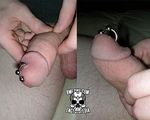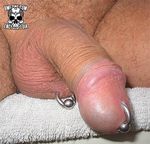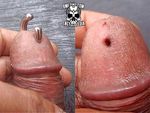Reverse Prince Albert piercing
A reverse Prince Albert Piercing is exactly what it says: a "reverse Prince Albert", meaning instead of the piercing exiting through the bottom of the glans (like a Prince Albert), it exits through the top.
Contents |
Placement
The Reverse PA is a urethral piercing, entering through the urethral opening and exiting through a hole in the top of the glans. This can be seen as either half an apadravya (the top half) or an upside-down PA.
Procedure
<this section should explain the common method by which the piercing is performed, if several different techniques are common, they should be individually explained in subheaders. The level of pain or discomfort likely to be encountered during the procedure should also be explained here. If there is an alternate procedure practiced either historically or by native peoples, it should be discussed here in a subheader.>
Healing and aftercare
<this section should explain the average length of the healing process, and any issues that may be present during that process (increased risk of STD transmission, potential for migration/rejection, etc...). Aftercare should describe common aftercare methods for the individual piercing.
Long-term health issues
<this section would describe and link to articles of specific relevance the potential long term effects of having the piercing. Migration/rejection, cheese cutter effect, potential for impact or torsion damage, etc... Maybe the "sexual effects" of piercings should be discussed here in a subheader?>
Jewelry
< this section should describe the common jewelry worn in the piercing, both the intital jewelery commonly used, and the more common types of jewelery worn in the healed piercing. Perhaps the "stretchability" of the piercing should also be discussed here, as it's directly related to the jewelery that is worn? If there's a particularily strange piece of jewelery or a device (like a chastity device) that's worn in the piercing, it should probably get a subheader>
History and culture
<This section should explain the origin(s)or supposed origin(s) of the piercing. Depending on the depth of material available this section could contain several subsections. The naming of the piercing, including alternate or regional namings should be here, including names in foreign languages, if available. The history of the piercing could be broken into several subheadings, as could it's practice in extant indigenous societies relative to its practice in contemporary Western/Eastern cultures.>
Reference
<any materials cited in the article should go here. Web materials should be linked, textual materials should be properly cited, as in a bibliography.>



